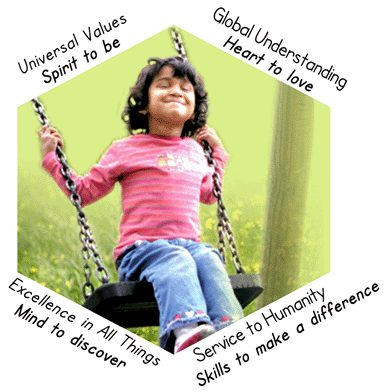Four Building Blocks

Four Building Blocks of Nurture's Broader Bolder Education

Four Building Blocks of Nurture Education
Universal Values
- Spiritual education is more important than material education. It says internal makeup of a child matters more than his external makeup. A tree is only as strong as its roots. Less emphasis should be placed on being smart, more on being good.
- Process is more important than the end result. It matters for example, children learn to do everything with perfection and beauty than rush through school's coursework whichever way.
Global Understanding
- Children must become leaders, cooperative workers and job providers, not just followers, competitors and job seekers. Both leadership training and cooperation must be part of the new educational process.
- Children must show reverence for all forms of life and things.
- Reverence must be taught as a direct objective of education. We are part of one global ethos.
Service to Humanity
- Children must develop a sense of empathy and kindness towards all peoples of the world and those less privileged than themselves.
- Education must prepare children to see their work as worship and service. Service must not be viewed as an occasional act of charity.
- Instead, service must become a way of life. Money is seen as a by-product of the good work, earned well through hard work and not an entitlement or the ultimate goal.
Excellence in All Things
- Excellence in All Things is teaching children to do their best always and strive for perfection and beauty.
- Recognise the potential of every child in a class to become a successful member of a family, society and the world.
- Nurture every child’s potential to become the best s/he can possibly be
- Do we in fact bring out the best in every child, or could we do more to nurture excellence in all things? How can we reorganise learning so as to inspire in every child an intrinsic desire to do one’s best always, and to appreciate beauty and perfection in all one does? Can we nurture our children's potential to go beyond the narrow confines of exam success, to teach them the qualities of excellence in both human and material forms?




